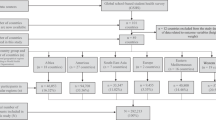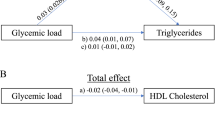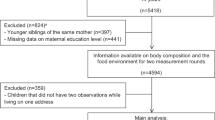Abstract
This cross-sectional analysis aimed to assess the association between free sugar consumption and the BMI z-score of Australian children and adolescents. Data from the 2007 Australian National Children’s Nutrition and Physical Activity Survey were analyzed. Structural equation modeling was used to assess the direct association between usual free sugar intake and age-and-sex-specific BMI z-score, and the indirect association mediated via energy overconsumption. Weak and statistically non-significant associations were found for the direct (BMI z-score β = −0.02 per 10% change in energy intake from free sugar, p = 0.705) and indirect pathways (BMI z-score β = −0.04 per 10% change in energy intake from free sugar, p = 0.705). We concluded that free sugar intake was not associated with BMI z-score in this cohort. Instead of focusing on a single energy source in the diet, improving the quality of the whole diet may be a better approach in tackling childhood obesity.
This is a preview of subscription content, access via your institution
Access options
Subscribe to this journal
Receive 12 print issues and online access
$259.00 per year
only $21.58 per issue
Buy this article
- Purchase on Springer Link
- Instant access to full article PDF
Prices may be subject to local taxes which are calculated during checkout

Similar content being viewed by others
References
Te Morenga L, Mallard S, Mann J. Dietary sugars and body weight: systematic review and meta-analyses of randomised controlled trials and cohort studies. Br Med J. 2013;346:e7492.
Malik VS, Pan A, Willett WC, Hu FB. Sugar-sweetened beverages and weight gain in children and adults: a systematic review and meta-analysis. Am J Clin Nutr. 2013;98:1084–102.
World Health Organization Guideline: sugars intake for adults and children. Geneva: World Health Organization; 2015.
University of South Australia, Australian Commonwealth Scientific and Research Organization i-VPL. User Guide—2007 Australian National Children’s Nutrition and Physical Activity Survey; 2009.
Louie JCY, Moshtaghian H, Boylan S, Flood VM, Rangan AM, Barclay AW, et al. A systematic methodology to estimate added sugar content of foods. Eur J Clin Nutr. 2015;69:154–61.
Harttig U, Haubrock J, Knüppel S, Boeing H. The MSM program: web-based statistics package for estimating usual dietary intake using the Multiple Source Method. Eur J Clin Nutr. 2011;65:S87–91.
DiMeglio DP, Mattes RD. Liquid versus solid carbohydrate: effects on food intake and body weight. Int J Obes Relat Metab Disord. 2000;24:794–800.
Albala C, Ebbeling CB, Cifuentes M, Lera L, Bustos N, Ludwig DS. Effects of replacing the habitual consumption of sugar-sweetened beverages with milk in Chilean children. Am J Clin Nutr. 2008;88:605–11.
Gibson S, Neate D. Sugar intake, soft drink consumption and body weight among British children: further analysis of national diet and nutrition survey data with adjustment for under-reporting and physical activity. Int J Food Sci Nutr. 2007;58:445–60.
Khan TA, Sievenpiper JL. Controversies about sugars: results from systematic reviews and meta-analyses on obesity, cardiometabolic disease and diabetes. Eur J Nutr. 2016;55:25–43.
Author information
Authors and Affiliations
Corresponding author
Ethics declarations
Conflict of interest
The authors declare that they have no conflict of interest.
Electronic supplementary material
Rights and permissions
About this article
Cite this article
Wong, T.H.T., Louie, J.C.Y. The direct and indirect associations of usual free sugar intake on BMI z-scores of Australian children and adolescents. Eur J Clin Nutr 72, 1058–1060 (2018). https://doi.org/10.1038/s41430-018-0124-z
Received:
Revised:
Accepted:
Published:
Issue Date:
DOI: https://doi.org/10.1038/s41430-018-0124-z
This article is cited by
-
Association of free sugar intake with blood pressure and obesity measures in Australian adults
European Journal of Nutrition (2020)



